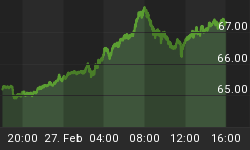Riots in the streets are not unheard of in even the most stable democracies, but the current furor in Hungary carries an added element of risk - namely, that Prime Minister Gyurcsany's loss of authority, particularly his claim to the moral high ground of "doing the right thing for the country," will undermine moves toward fiscal reform.
As we've noted before (most recently, Hungary: Central Bank Tightens By More Than Expected, Further Rate Hikes Likely), Hungary suffers from the classic "twin deficits" problem - a hefty current account deficit (7.3% of GDP last year) combined with a substantial fiscal shortfall (heading to 10%+ this year). In addition, foreign currency-denominated loans account for a substantial portion of new borrowing, both business and household, making the economy particularly vulnerable to the negative effects of any currency depreciation.
The re-elected government's fiscal reform package relies almost entirely on tax hikes, particularly an increase in the VAT rate on some goods, at the same time that utility prices are climbing. As a result, both headline and core inflation are rising rapidly - the headline rate hit an annual 3.5% in August, up from 3.0% in July and just 2.3% in April, with core inflation climbing to 2.4% (1.9% in July and 0.7% in April). This has the National Bank of Hungary (NBH) in a tightening mode - three hikes in as many months, taking its benchmark rate up by 125bp to 7.25%, with the most recent (unanimous) decision a 50bp increase on August 28.
Meanwhile, the impact of the tax hikes is likely to slow the pace of real GDP growth heading into next year, even as the rate of inflation climbs. Q2 real GDP growth already surprised on the downside, slowing to an annual 3.6% even as GDP in the rest of the region accelerated. And therein lies the NBH's dilemma. The forint's weakening over the past year has already increased households' debt payment burden, and the tax hikes will further squelch domestic consumption. The economy is slowing at the same time that the central bank must hike rates to meet the inflation target.

The protests in Budapest were sparked by the leak of a tape in which PM Gyurcsany, in an apparent bid to get Socialist Party members to admit their mistakes and support the need for reform, railed at his colleagues for "lying" to the public about the state of the public finances in order to win re-election. The tax hike package had already pushed the government's popularity down from 40% at the time of the April election, to just 25%. Hearing their PM denounce his own government as a bunch of liars who achieved nothing in their first four years in office will hardly have the voters flocking to his side. The key question is whether the backlash over reform will now coalesce into a more concerted anti-government movement.
For now, the Socialist Party and the junior coalition partner Alliance of Free Democrats are staunchly defending their prime minister. However, key local government elections will be held October 1, and there is a risk that a sharp drop in support for the ruling parties will spell the end of Gyurcsany's political career.
The PM has been the driving force behind the shift to fiscal austerity. If he is ousted, particularly in the midst of popular protests, there is a real risk that the reform program will be ejected with him. That would trigger downgrades from the sovereign rating agencies - Moody's A1 and S&P's BBB+ ratings already carry negative outlooks - and a drop in the forint, raising the specter of an outright payments crisis in 2007.
Meanwhile, some of Hungary's central European neighbors are also mired in political disarray, with fractious coalitions elected in Poland and Slovakia that include radical parties keen to block reform, and near-political stalemate in the Czech Republic that could yet lead to fresh elections. While these three all have far better economic fundamentals than Hungary, the sense that things are somehow amiss in the region may unnerve less discerning investors.
We should also add to the Hungarian mix the fact that there is no love lost between the Socialist government and the soon-to-retire NBH Governor Zsigmond Jarai. The Governor (a finance minister with the previous Fidesz administration), made contentious remarks criticizing the Socialist government's policies ahead of the April general election, giving the appearance of a partisan political bias. And, although the NBH claims to focus only on containing inflation, there have been times when it has seemed more concerned about the exchange rate, leading to concerns about transparency and consistency in the setting of monetary policy. (This confusion reached a peak in early-2003, culminating in a 2% devaluation of the forint's central rate against the euro that June.)
All of this will make for some interesting discussions at the NBH meeting next Monday (September 25). The outlook for the coming 24 months - the NBH's reference timeframe for containing inflation - is now murkier than ever. With inflation set to climb still higher in the near term, the bank will likely raise rates by another 50bp. But over the coming months, if a political crisis leads to a sharp fall in the forint, or the fiscal austerity program is abandoned, will the bank be willing to step in and shore up the currency with more aggressive tightening?















